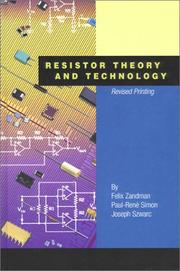| Listing 1 - 2 of 2 |
Sort by
|

ISBN: 189112112X 9781891121128 Year: 2001 Publisher: Malvern Vishay intertechnology
Abstract | Keywords | Export | Availability | Bookmark
 Loading...
Loading...Choose an application
- Reference Manager
- EndNote
- RefWorks (Direct export to RefWorks)
Electric resistors --- Electronics --- Electric conductors --- Electronic apparatus and appliances --- Electronique --- Conducteurs électriques --- Composants électroniques --- Materials --- Matériaux --- 621.316.8 --- Resistors. Rheostats --- 621.316.8 Resistors. Rheostats --- Conducteurs électriques --- Composants électroniques --- Matériaux --- Electronic materials --- Electronic devices --- Physical instruments --- Scientific apparatus and instruments --- Electronic instruments --- Resistors, Electric --- Electric contactors --- Electric resistance --- Passive components --- Electrodes --- Conductors, Electric --- Apparatus and appliances --- Resistor technology --- Resistor theory --- RESISTORS --- Monograph --- Microprocesseurs --- Electronics - Materials --- Resistance electrique --- Resistors
Book
ISBN: 0691184178 9780691184173 0691179433 9780691179438 Year: 2019 Publisher: Princeton, NJ : Princeton University Press,
Abstract | Keywords | Export | Availability | Bookmark
 Loading...
Loading...Choose an application
- Reference Manager
- EndNote
- RefWorks (Direct export to RefWorks)
"A few short decades ago, we were informed by the smooth signals of analog television and radio; we communicated using our analog telephones; and we even computed with analog computers. Today our world is digital, built with zeros and ones. Why did this revolution occur? The Discrete Charm of the Machine explains, in an engaging and accessible manner, the varied physical and logical reasons behind this radical transformation. The spark of individual genius shines through this story of innovation: the stored program of Jacquard’s loom; Charles Babbage’s logical branching; Alan Turing’s brilliant abstraction of the discrete machine; Harry Nyquist’s foundation for digital signal processing; Claude Shannon’s breakthrough insights into the meaning of information and bandwidth; and Richard Feynman’s prescient proposals for nanotechnology and quantum computing. Ken Steiglitz follows the progression of these ideas in the building of our digital world, from the internet and artificial intelligence to the edge of the unknown. Are questions like the famous traveling salesman problem truly beyond the reach of ordinary digital computers? Can quantum computers transcend these barriers? Does a mysterious magical power reside in the analog mechanisms of the brain? Steiglitz concludes by confronting the moral and aesthetic questions raised by the development of artificial intelligence and autonomous robots. The Discrete Charm of the Machine examines why our information technology, the lifeblood of our civilization, became digital, and challenges us to think about where its future trajectory may lead." -- Publisher's description.
Digital communications. --- Technological innovations. --- Breakthroughs, Technological --- Innovations, Industrial --- Innovations, Technological --- Technical innovations --- Technological breakthroughs --- Technological change --- Creative ability in technology --- Inventions --- Domestication of technology --- Innovation relay centers --- Research, Industrial --- Technology transfer --- Communications, Digital --- Digital transmission --- Pulse communication --- Digital electronics --- Pulse techniques (Electronics) --- Telecommunication --- Digital media --- Signal processing --- Digital techniques --- Digital communications --- Technological innovations --- AND gate. --- Alan Turing. --- Algorithm. --- Analog computer. --- Analog device. --- Analog signal. --- Analog-to-digital converter. --- Artificial neural network. --- Autonomous robot. --- Bell's theorem. --- Calculation. --- Charles Babbage. --- Church–Turing thesis. --- Classical physics. --- Claude Shannon. --- Compact disc. --- Computation. --- Computer music. --- Computer program. --- Computer science. --- Computer scientist. --- Computer. --- Computing. --- Data transmission. --- Detection. --- Difference engine. --- Differential equation. --- Digital data. --- Digital electronics. --- Digital signal processing. --- Digital signal. --- Diode. --- Electrical network. --- Electricity. --- Electromagnetic radiation. --- Electronics. --- Exponential growth. --- Field-effect transistor. --- Fourier analysis. --- High frequency. --- Information theory. --- Instance (computer science). --- Instruction set. --- Integrated circuit. --- Integrator. --- Isaac Asimov. --- Johnson–Nyquist noise. --- Laptop. --- Laughter. --- Logarithm. --- Low frequency. --- Mathematician. --- Mathematics. --- Measurement. --- Microphone. --- Microphotograph. --- Microscope. --- Molecule. --- Moore's law. --- NP-completeness. --- Optical fiber. --- P versus NP problem. --- Patch panel. --- Photograph. --- Photon. --- Physicist. --- Probability. --- Processing (programming language). --- Proportionality (mathematics). --- Punched card. --- Quantity. --- Quantum computing. --- Quantum mechanics. --- Radio wave. --- Resistor. --- Result. --- Retransmission (data networks). --- Richard Feynman. --- Scientist. --- Semiconductor. --- Shot noise. --- Silicon. --- Simulation. --- Solid-state electronics. --- Sound recording and reproduction. --- Standardization. --- Technology. --- Television. --- Theorem. --- Theoretical computer science. --- Time complexity. --- Transistor. --- Turing machine. --- Uncertainty. --- Vacuum tube. --- Vacuum. --- Video. --- Wafer (electronics). --- Wave–particle duality. --- Your Computer (British magazine).
| Listing 1 - 2 of 2 |
Sort by
|

 Search
Search Feedback
Feedback About UniCat
About UniCat  Help
Help News
News